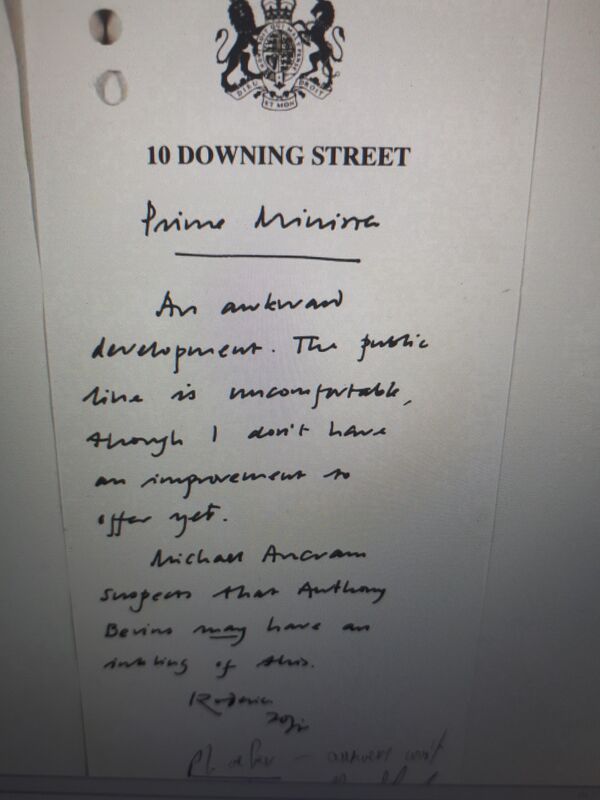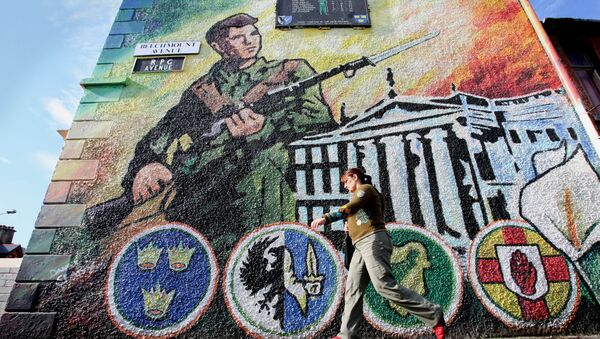Two weeks after the Provisional IRA declared its ceasefire the leader of Sinn Fein, Gerry Adams, handed a list of 22 questions to the Irish government, who passed them on to their British counterparts.
An Irish civil servant, Sean O'Huiginn, passed the letter to a senior civil servant in the Northern Ireland Office, Quentin Smith, and a memo was sent to Roderick Lyne, private secretary to Prime Minister John Major, to explain what Adams wanted.
"Mr O'Huiginn made it clear that the Irish government were not formally passing the letter and the questions to us: indeed, the letter from Mr Adams makes clear that the Irish government is not meant to ‘engage' the British government ‘until you receive confirmation that the British government is willing to address the matters outlined above," says the letter to Mr. Lyne.
on the 23rd of October 1993 at approximately 1:06pm, the Shankill road was shaken by the sound of a 5lb bomb planted by the provisional IRA, killing 9 innocent victims and injuring around 57 others as they went about their business on A busy Saturday… https://t.co/WCRYIjA8tQ pic.twitter.com/goyfFl1O5U
— Jonathan Airdrie (@jonny1912) 20 October 2018
Fears That Sinn Fein/IRA Might Leak Questions
The letter to Mr. Lyne outlines the "potential for embarrassment" if it becomes clear the British government has received the 22 questions and not replied.

"An awkward development. The public line is uncomfortable, though I don't have an improvement to offer yet," said Mr. Lyne in a handwritten note to the Prime Minister, which added that Guardian journalist Anthony Bevins "may have an inkling of this."
Adams' questions were in response to the December 1993 Downing Street Declaration, which was issued by Mr. Major and Ireland's Taoiseach, Albert Reynolds.
Catholic identification patterns, 1968-2016. Despite just under 90% of those from the Catholic community voting for nationalist parties, just over 1/3 of those voters want a united Ireland. You read correctly: 2 out of every 3 SF/SDLP voters don't want N. Ireland to leave the UK. pic.twitter.com/AZJCW4QOUy
— Cllr Dale Pankhurst (@Dale_Pankhurst) 26 December 2018
In it the British government stressed it had no "selfish strategic or economic" interest in Northern Ireland and Mr. Reynolds agreed to amend the Irish constitution to enshrine the principle that a united Ireland could only come to pass with the support of the majority of those in the six counties of Northern Ireland.
"The British government has said that it has 'no selfish strategic or economic interest in Northern Ireland'. Would it not be more in accord with democratic principles for the British government to base its Irish policy on the objective of ending the union?" asked Adams in the fifth of his 22 questions.
Was the thrilled to receive a signed copy of The Negotiators Cook Book from Santa Claus. @GerryAdamsSF looking forward to trying a few recipes in the New Year. pic.twitter.com/9KDIWWLhOg
— Chris Hartnett (@chrisharty3) 26 December 2018
He then goes on to claim a British government had made a remarkable candid admission to Sinn Fein representatives in 1993.
Oh The Irony of Questions Over Irish Border!
"The final solution is union (of the island of Ireland). It is going to happen anyway. The historical train — Europe — determines that. We are committed to Europe. Unionists will have to change. The island will be as one," Adams claims the British government representative had said.
"Is this the position of the British government?" added Adams.
Adams also asks how the process of demilitarisation will proceed "in real terms" and asks how the British government plans to address the issue of an amnesty for "political prisoners", meaning convicted republican and loyalist paramilitaries.
There is no record of the British response to these questions — which were likely to have inflamed loyalists and unionists — but the queries about the union of the island of Ireland, and the dissolution of the Irish border have an added poignancy as it has become such a key issue during the Brexit negotiations.
The IRA ended their ceasefire in February 1996 but the new Labour government managed to get the Provisionals to lay down their weapons for good the following year and negotiated the Good Friday Agreement.


